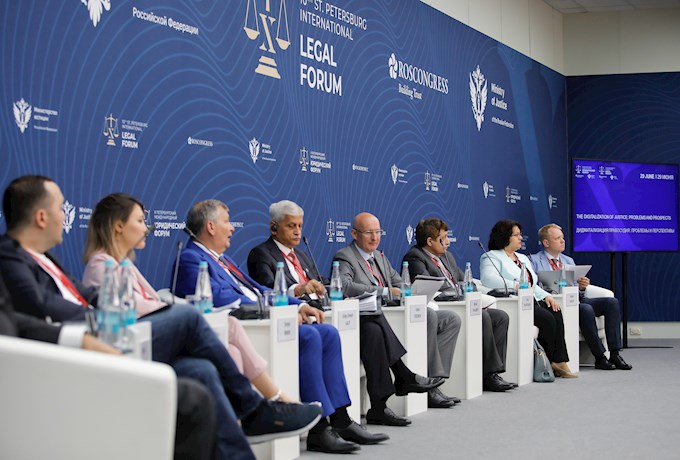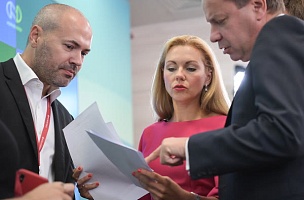Key conclusions
Digitalization as a way to make justice more accessible has become an integral part thereof
“The pandemic has given a strong impetus to the development of IT solutions, which is reflected in the court proceedings. The introduction of modern technologies is the most effective way to improve the accessibility and quality of justice. Criminal prosecution is traditionally more conservative, but now there are interrogations, one-on-ones, and other instances that include video-conferencing,” Vadim Fedorov, Deputy Minister of Justice of the Russian Federation.
“Video recordings have practically become standard evidence: according to the CAO, they are used automatically. According to the Code of Civil Procedure, the court decides whether it can or cannot use them. It seems to me that we are really advanced, from the technological point of view,” Dmitry Ter-Stepanov, Deputy General Director – Director of Regulatory Control, Digital Economy.
Digitalization improves transparency of prosecution
“The introduction of electronic services can speed up the process, reduce the workload, and most importantly, make the judicial process clear and convenient for citizens and businesses,” Vadim Fedorov, Deputy Minister of Justice of the Russian Federation.
“Virtually every court in the country operates in both traditional and online formats. Participants in the process can decide for themselves whether they want to be present physically or online,” Uday Umesh Lalit, Judge, Supreme Court of the Republic of India.
PROBLEMS
Lack of technical skills to work with the evidence
“Today, video conferencing systems in pre-trial detention facilities are gradually becoming obsolete, in the future these systems should be updated,” Mikhail Shalumov, Deputy Head of Department - Head of Division for Systematisation of Legislation and Analysis of Judicial Practice in Criminal Matters, Department for Systematisation of Legislation and Analysis of Judicial Practice, Supreme Court of the Russian Federation.
“There are problems when we use virtual platforms, it can be difficult to produce evidence and proof. We have had legislative amendments to clarify what approach to take when dealing with electronic evidence,” Albina Aubakirova, Head of the Department for Coordination of Legislative Activities of the Department of Legislation, Ministry of Justice of the Republic of Kazakhstan.
“For me, the digitalization of justice today is no longer about paperwork. It is about being able to recognize faces, recognize speech, be able to fight fakes, and so on. If we look at justice as a base, it has to do, first of all, with the way a judge makes decisions. They take the evidence processed by technology and begin to evaluate it. What is offered to the judge, if it is processed by technology, does not always contain the full picture. And it is not always the fault of the developers,” Yulia Kharitonova, Professor of the Department of Entrepreneurial Law, Faculty of Law, Lomonosov Moscow State University.
SOLUTIONS
Perfecting the legislature
“This year, the Ministry of Justice prepared a draft law allowing all participants in a court session to participate via videoconferencing. This draft law has been submitted to the Government of the Russian Federation. It marks the transition to modern court proceedings that meet the demands of the time. This is an important step to save time and material resources. It will not entail the abolition of classical court proceedings, the question of the form of participation will be decided by the court,” Vadim Fedorov, Deputy Minister of Justice of the Russian Federation.
Ban on using videoconferencing during jury trials
“I think a degree of caution is being exercised not to try cases by jury trial with videoconferencing. In addition, we propose to limit the use of video to those cases where there is no opportunity to bring the defendant to the courtroom, for example, if it is a long quarantine or security measures,” Mikhail Shalumov Deputy Head of Department - Head of Division for Systematisation of Legislation and Analysis of Judicial Practice in Criminal Matters, Department for Systematisation of Legislation and Analysis of Judicial Practice, Supreme Court of the Russian Federation.
“The court's obligation to ensure communication between the defendant and defense counsel using video is specifically stipulated. Video conferencing will not be used in a jury trial,” Vadim Fedorov, Deputy Minister of Justice of the Russian Federation.
Creating unified platforms and using algorithms in court
“Kazakhstan is making efforts to modernize its judicial system. We have created a unified system of advocacy. The service simplifies the interaction of lawyers with the authorities, the system provides paperless document flow, equal and equitable distribution of legal information for lawyers. The system allows to appoint a lawyer, to provide payment, and also suppresses possible corruption,” Albina Aubakirova Head of the Department for Coordination of Legislative Activities of the Department of Legislation, Ministry of Justice of the Republic of Kazakhstan
“Applications are used extensively in everyday life. When some of our clients do not fulfil their obligations, we have to go to court, and then we have to translate [the data – Ed.] back to paper, and that paper is presented in courts. The second step is when the courts will receive their implementation of algorithms which allow the use of machine-readable versions of documents, the actual evidence. And then a person will make a decision already on the basis of machine checks. If you look at the logic of the courts, the verification of actual circumstances takes a lot of time, in this sense algorithms could simplify the work of judges,” Sergey Minkin, Head of Judicial Protection, Legal Department, Sberbank.
For more information, visit the Roscongress Foundation’s Information and Analytical System at roscongress.org






